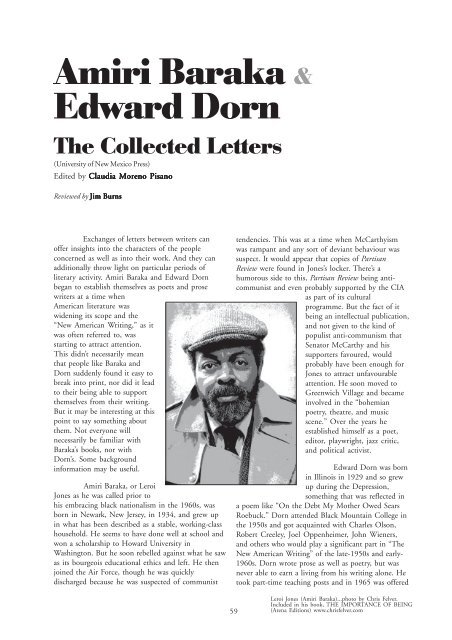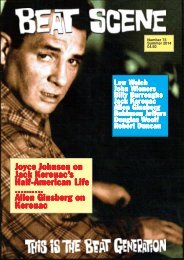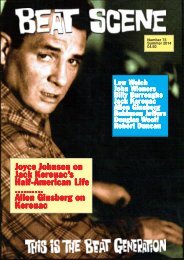You also want an ePaper? Increase the reach of your titles
YUMPU automatically turns print PDFs into web optimized ePapers that Google loves.
Amiri Baraka &<br />
Edward Dorn<br />
The Collected Letters<br />
(University of New Mexico Press)<br />
Edited by Claudia Moreno Pisano<br />
Reviewed by Jim Burns<br />
Exchanges of letters between writers can<br />
offer insights into the characters of the people<br />
concerned as well as into their work. And they can<br />
additionally throw light on particular periods of<br />
literary activity. Amiri Baraka and Edward Dorn<br />
began to establish themselves as poets and prose<br />
writers at a time when<br />
American literature was<br />
widening its scope and the<br />
“New American Writing,” as it<br />
was often referred to, was<br />
starting to attract attention.<br />
This didn’t necessarily mean<br />
that people like Baraka and<br />
Dorn suddenly found it easy to<br />
break into print, nor did it lead<br />
to their being able to support<br />
themselves from their writing.<br />
But it may be interesting at this<br />
point to say something about<br />
them. Not everyone will<br />
necessarily be familiar with<br />
Baraka’s books, nor with<br />
Dorn’s. Some background<br />
information may be useful.<br />
Amiri Baraka, or Leroi<br />
Jones as he was called prior to<br />
his embracing black nationalism in the 1960s, was<br />
born in Newark, New Jersey, in 1934, and grew up<br />
in what has been described as a stable, working-class<br />
household. He seems to have done well at school and<br />
won a scholarship to Howard University in<br />
Washington. But he soon rebelled against what he saw<br />
as its bourgeois educational ethics and left. He then<br />
joined the Air Force, though he was quickly<br />
discharged because he was suspected of communist<br />
tendencies. This was at a time when McCarthyism<br />
was rampant and any sort of deviant behaviour was<br />
suspect. It would appear that copies of Partisan<br />
Review were found in Jones’s locker. There’s a<br />
humorous side to this, Partisan Review being anticommunist<br />
and even probably supported by the CIA<br />
as part of its cultural<br />
programme. But the fact of it<br />
being an intellectual publication,<br />
and not given to the kind of<br />
populist anti-communism that<br />
Senator McCarthy and his<br />
supporters favoured, would<br />
probably have been enough for<br />
Jones to attract unfavourable<br />
attention. He soon moved to<br />
Greenwich Village and became<br />
involved in the “bohemian<br />
poetry, theatre, and music<br />
scene.” Over the years he<br />
established himself as a poet,<br />
editor, playwright, jazz critic,<br />
and political activist.<br />
Edward Dorn was born<br />
in Illinois in 1929 and so grew<br />
up during the Depression,<br />
something that was reflected in<br />
a poem like “On the Debt My Mother Owed Sears<br />
Roebuck.” Dorn attended Black Mountain College in<br />
the 1950s and got acquainted with Charles Olson,<br />
Robert Creeley, Joel Oppenheimer, John Wieners,<br />
and others who would play a significant part in “The<br />
New American Writing” of the late-1950s and early-<br />
1960s. Dorn wrote prose as well as poetry, but was<br />
never able to earn a living from his writing alone. He<br />
took part-time teaching posts and in 1965 was offered<br />
59<br />
Leroi Jones (Amiri Baraka)...photo by Chris Felver.<br />
Included in his book, THE IMPORTANCE OF BEING<br />
(Arena Editions) www.chrisfelver.com





